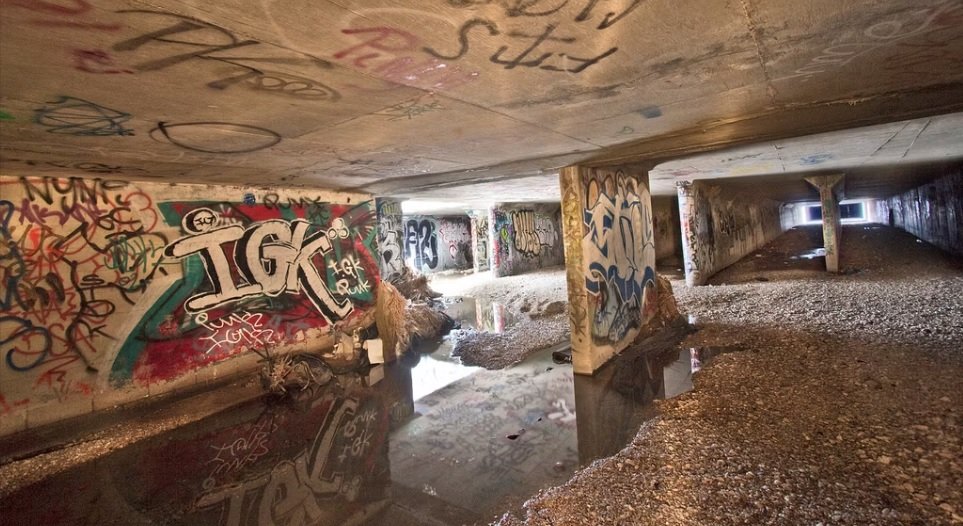Posted on: August 15, 2022, 02:38h.
Last updated on: August 15, 2022, 05:23h.
Two individuals died in a flood channel near Mandalay Bay on Aug. 12. It is unknown whether they were residents of the interconnected network of channels stretching hundreds of miles across the Las Vegas Valley.

When floods ravage Las Vegas, as they have for two of the past four weekends, the hope is that residents and tourists make it safely back to their homes or hotels. However, home is a flood channel for one unfortunate subset of residents. That means flash floods prove exceptionally fatal to this population.
The flood channels have a population thought to swell to around 1,000. Hundreds of miles stretch across the Las Vegas Valley, eventually returning stormwater to Lake Mead. But the most populated section ushers Flamingo Wash beneath Caesars Palace and the I-15.
In 2016, three individuals died because of channel flooding. One of their bodies was found washed a mile downstream.
Dark at the End of the Tunnel
Homeless people began moving into “the tunnels,” as they call them, as soon as they were completed in the ’80s. They provide daytime shelter from the unrelentingly hot sun and a nighttime break from the police officers who regularly usher along those trying to sleep on the Las Vegas Strip sidewalks above them.
This is only a temporary situation for me,” said a tunnel resident who provided a fake name, Chuck, as a condition of speaking to Casino.org.
The interview was conducted during a tour of the Flamingo Wash tunnels given 10 years ago by Matt O’Brien, author of Beneath the Neon: Life and Death in the Tunnels of Las Vegas. This 2007 book tracked the lives of several tunnel residents over the years.

Chuck seemed the most out of place of the four residents consenting to an interview that day. The middle-aged man wore a blue Hello Kitty T-shirt and a bright smile as he grilled a Nathan’s hot dog over a small propane burner on a neatly made up mattress.
“I’m a disabled veteran,” Chuck explained. “But I save up my Social Security checks. I don’t gamble them away like a lot of people down here do. I had an apartment downtown that I’m going to get back into.”
Chuck had a required tunnel accessory handy: a stolen shopping cart. That’s because the tunnels are indeed only a temporary situation for every tunnel resident. When it rains as hard as it has this month, anything not removed from the tunnels in time gets washed away by millions of gallons of rushing swift water. The water line occasionally reaches the top of the tunnel’s shafts.
The county empowers a homeless outreach team to enter the tunnels and warn all residents whenever any rain is forecast. However, that team is not empowered to force people to leave the tunnels.
Fates Unknown
One can only hope that Chuck made it back it out of the tunnels before the recent flash floods — maybe even back into that apartment he was saving for.
“A lot of people you get to know in the tunnels, you just have no idea what becomes of them,” O’Brien said. “Some are dead, some are in prison, some have moved to a different place in the drains. Some are on the streets. And then, hopefully, a few have fought their way out.”
To give that last scenario a helping nudge, O’Brien founded a 501(c)(3) non-profit called Shine a Light in 2009. Now a Freedom House Sober Living program, Shine a Light offers housing, drug counseling, job training, and medical attention to hundreds of tunnel residents. Its volunteers regularly traverse the tunnels to distribute food, water, clothing, batteries, and flashlights.
O’Brien can detail the fate of one former tunnel resident he met while researching his book. That’s because Robert Banghart is now employed as Shine a Light’s outreach director.
“I’ve healed from a lot of things I’ve went through out there by going back and giving back,” Banghart said. “And it’s also a very good reminder. Like where I could end up, where I have been. It keeps me very humble. It keeps me very grateful.”
